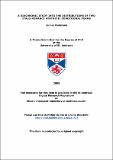A diachronic study into the distributions of two Italo-Romance synthetic conditional forms
Abstract
Two distinct conditional paradigms are available to speakers of Italian, derived from the Latin periphrases cantare habui/cantare habebam. The aim of this thesis is to describe and explain their patterns of attestation in the earliest northern Italian and Tuscan texts, which date from between 1200 and 1400.
Textual analysis showed that while the cantare habui periphrasis was native to both areas, the use of the cantare habebam periphrasis differed in the northern and central dialects. In the northern dialects, the cantare habebam periphrasis was attested in all genres over the whole time period, whereas in the Tuscan dialects it only appeared in literary genres. Moreover, although the northern texts attested both periphrases consistently over time in every genre, only Tuscan poetry followed this pattern. Other genres attested reflexes of the cantare habebam periphrasis for short periods in the fourteenth century. These results suggest that different influences resulted in different patterns of conditional use in the two areas.
This thesis postulates that in the northern Italo-Romance dialects the cantare habebam periphrasis was introduced through the proximity to, and influence of, Provençal. Although the use of reflexes of cantare habebam was reinforced in the north by the Sicilian school of poets, the dual nature of the sources meant that it was also retained in prose, and thence into modern dialect use. In contrast, reflexes of the cantare habebam periphrasis were introduced into central Italy through the Sicilian school alone. Although it appeared in prose texts, this was a sporadic phenomenon, resulting from imitation of the influential poetic texts. Because there was no prose source for reflexes of the cantare habebam periphrasis, it did not enter non-literary genres and quickly disappeared from literary prose genres. The cantare habebam periphrasis eventually disappeared entirely from Tuscan poetry as well, and is not attested at all in the modern central dialects.
Type
Thesis, PhD Doctor of Philosophy
Collections
Items in the St Andrews Research Repository are protected by copyright, with all rights reserved, unless otherwise indicated.

